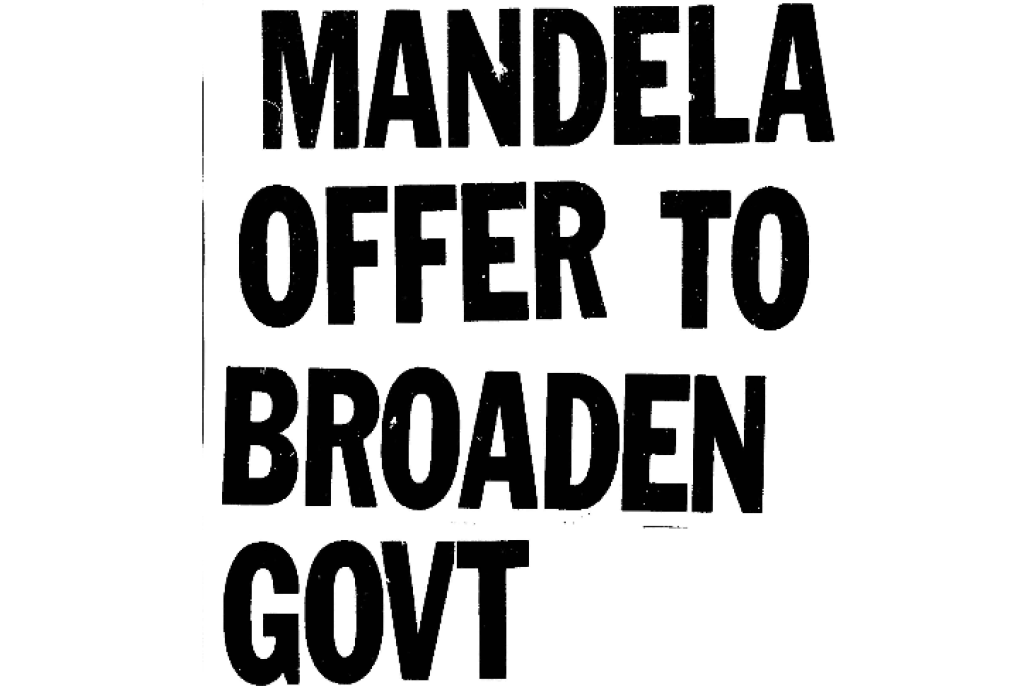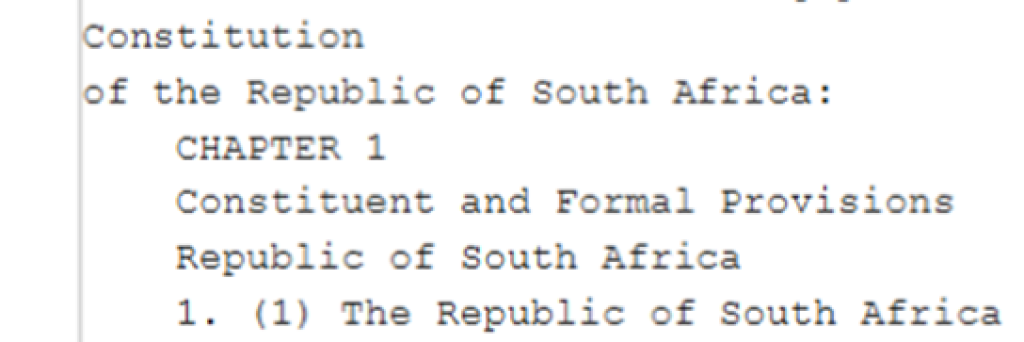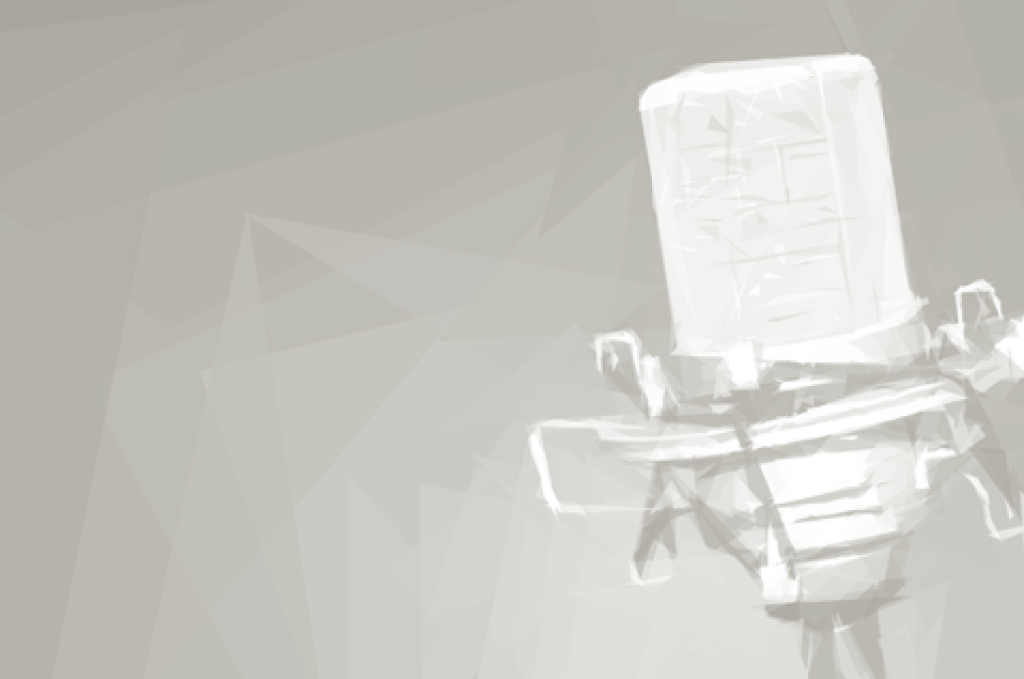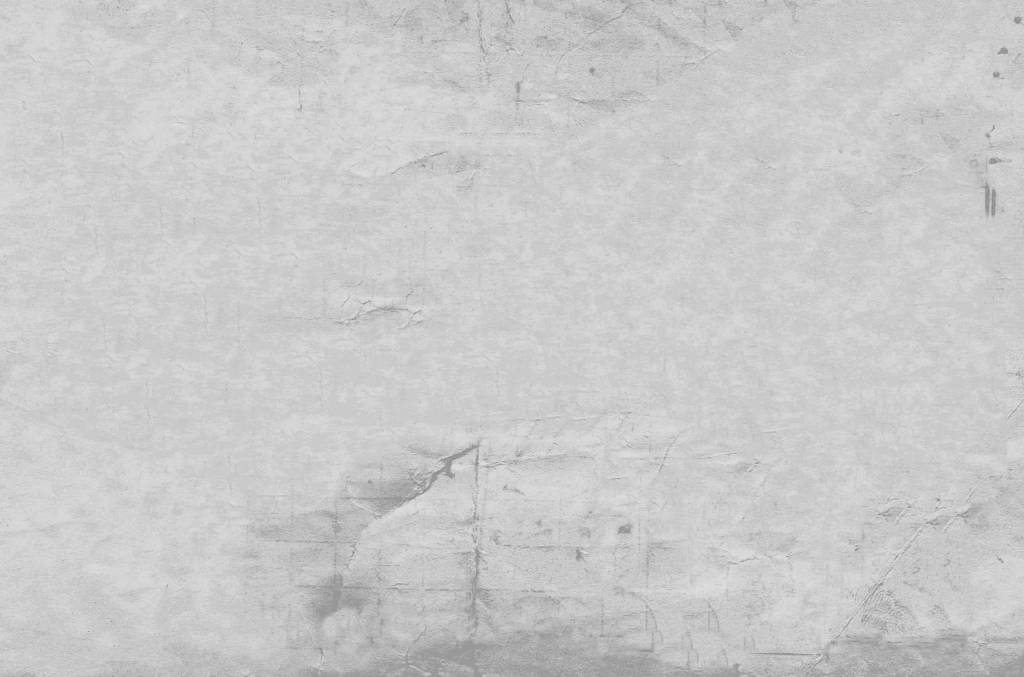Looking back, Mandela named three priorities of his time as President:
I had to concern myself with nation building; with reconciliation – to say let us forget the past, let’s deal with the present and the future; then with the important question of delivery to our people. These are the three things I was concerned with.454

the white minority in this country had one of the most powerful armies in Africa.
Reconciliation was part of the larger project of nation-building. It was a matter both of reconciling former enemies with one another, erstwhile oppressor and oppressed; and reconciling those privileged by the past to the loss of privilege and to their responsibility to help build an equitable future by using the advantages they had gained, including command over most of the country’s resources.
The breadth of the approach was signaled in talks Mandela had with the smaller parties in the early days of his presidency. Soon after the 1994 election Mandela broached the question of smaller parties participating in government. He held discussions with the PAC, Azapo, Democratic Party, Conservative Party and Freedom Front. He recalled that when he came out of prison De Klerk had proposed that a troika of NP, ANC and IFP should negotiate South Africa’s future, a concept which he and the ANC had rejected in favour of an inclusive approach.
Although the constitution did not provide for the inclusion of the smaller parties in Cabinet at that time, he said that he was prepared to work for a change in the constitution to accommodate them. But at that stage practical discussions were about appointments to the diplomatic service, civil service and other government structures. They also included questions of amnesty and integration of APLA combatants of the PAC into the defence force.455

Alongside the issue of party political accommodation, the guiding vision was one of equality, evoked in the Freedom Charter’s declaration that, ‘South Africa belongs to all who live in it’ and ‘All national groups shall have equal rights’. But the path towards that goal started from vastly unequal power, opportunities and conditions amongst the ‘national groups’ whose equal status and rights the Charter demanded. The challenge was for the group which had monopolised power, resources and opportunities to its own advantage and to the detriment of others, to accept its loss of power and commit in mind and action to building a society in which all enjoyed equal respect, opportunities and attention to basic needs.
If whites in general were to be reconciled, Afrikaners were a particular focus.
I considered it my duty to keep in contact with all our country’s communities; but it is a fact that of all the groups, I had the most sustained contact with Afrikaners.
Although this remark painted Afrikaners with a broad brush, it was a community that was socially differentiated and politically divided over the transition.
Civil war and violent disruption of the founding election by those demanding Afrikaner self-determination had been averted, but the sentiments were still there, undiminished, when the new government took office. Two things were required. One was establishing the Volkstaat Council, as agreed in negotiations, to look into the question of Afrikaner self-determination. And the other was persuading the Afrikaner community to feel at home in the broader South Africa, thereby sapping support for a separate arrangement. Both would lessen the possibility of action by disaffected elements to resist change or destabilise the country. Mandela pursued both tracks.
Reconciliation faced headwinds from various quarters, often eliciting Mandela’s forceful defence and explanation. In June 1995, after the Volkstaat Council had submitted its first report, Mandela responded in the Senate to hostility to even considering the possibility of a Volkstaat.
On the more general question of the report of the Volkstaat Council, I wish to reiterate that my organisation, and I personally, will study the report with sensitivity. We will do so, taking into account the co-operation by these leaders in the peaceful transition. At the same time, we remain firmly committed to the principles of democracy, nonracialism and equality.
Many of you do not know what dangers faced this country just before the elections. However, those of us who negotiated as far back as 1986, and especially shortly before the election, know that we were on the brink of a catastrophe which could have plunged this country into bloodshed.
Through confidential discussions without publicity, we were able to bring around some of those people who were determined and whose plans were finalised to plunge this country into bloodshed. It is easy for you to say that there will be no Volkstaat in this country. That is easy for you, because you did not do the work. You do not know what dangers we have averted.
Because elements from the old order could deny the country stability, Mandela paid close and continuing interest in the security forces. The potential for broader resistance or disaffection informed his sensitivity towards the culture and symbols close to the hearts of the Afrikaner community, whether it was language or the Springbok symbol of national sporting teams.
When a sports commission recommended in March 1996 that the Springbok symbol be dropped, Mandela criticised it from the perspective of a threat from rightwing extremists: there were people both inside and outside the ANC, he said, who ‘are not aware that there are still powerful elements among whites who are not reconciled with the present reconciliation and who want to use every excuse in order to drown the country in bloodshed. That is the reality of the situation. But many people do not appreciate this.’458
The anthem was another sensitive issue. The use of both Nkosi Sikelele and Die Stem sung in sequence was an interim arrangement agreed in negotiations before the election by the ANC and National Party. The interim constitution declared that ‘The national anthem of the Republic shall be as determined by the President by proclamation in the Gazette.’459
On becoming President, Mandela got a team to work on producing a shorter and less awkward combined anthem.460 But in September 1996, during the drafting of the final constitution, the ANC National Executive Committee took two decisions about the anthem before Mandela arrived at the meeting. One was that the new constitution should, like the interim one, not specify the anthem but provide that it should be determined by the president by proclamation. The second was that the national anthem should be Nkosi Sikelele translated into four languages. Mandela only learned of this decision after the meeting and told the National Working Committee that such a matter should not have been decided in his absence as president and that the NEC should review the decision.461 When the issue was discussed again it was agreed that it was not time for a change, without excluding the possibility that it would happen after 1999.462
Although the National Party wanted the mixed anthem to be written into the new constitution the matter was left as it had been in the interim constitution, namely to be determined by the president by proclamation. At the dinner celebrating the Constitutional Assembly’s adoption of the constitution Mandela said he intended retaining the mixed anthem and that ‘if any change is envisaged I would want to give a firm assurance that it would only done in full consultation with all the parties, taking into account majority and minority feelings.’463 In October 1997, when the team had completed its work, he proclaimed the new hybrid composition to be the national anthem.
When the ANC national conference discussed the issue two months later in Mafikeng it simply resolved that the ‘NEC should review the acceptability of the current national anthem.464

there are still powerful elements among whites who are not reconciled



not because it came from a senior leader, but because of the way he argued the point


creating a sense of patriotism
The interdependence of reconstruction and development on the one hand and nation–building and reconciliation on the other, was the fundamental point of departure.
The socio-economic programme which we have set ourselves requires immense resources. We cannot face these problems if there is instability in our country. This nation-building must not be a question of rhetoric.465

But more often than not in public discourse the two aspects were debated as competing options. Mandela found himself early on having to defend the approach against the charge that the reconciliation effort meant paying more attention to white fears than black needs, as he did when an ANC member of the then Senate raised the question in a debate in September 1994.
We are faced with a problem which some of us have raised from time to time.
I refer to the difficulty of the White minority in this country, with its background of privileges which excluded the Blacks, not only from the centres of power, but also from enjoying the resources of this country.
The fact is that today the White minority, which has been in power for almost three centuries, now faces the possibility of a partnership with a majority which has been excluded, and that has led to the feelings of insecurity that the democratic changes which we are hailing, might eventually lead to the domination of the Whites by the Black majority. That attitude is lacking in the approach to problems by our White counterparts in the country.
That is not the only problem, however. We are also faced with the problems of Blacks who have been in the liberation movement, who have become committed to resistance and who want to continue that tradition at a time when they are required to build, and who feel they should oppose anything which will result in eventual reconciliation and nation-building.
These are the twin problems which we are facing, and it is here that king-makers are required to address these problems objectively and sincerely with a common love for and loyalty to our people and our country.
… About two months ago I had a conversation with a leading Afrikaans speaking personality. He personalised the achievements of the South African people. He said I had no idea what I had done for their people, the Afrikaners. He felt that this was his country too. According to him it was not only I who was liberated, but that he was liberated too. He was prepared to serve South Africa and this was due to my strength.
I was beginning to swell with pride when he turned around and said this was also a sign of a grave weakness on my part. He said that I was concerned with assuring Whites and neglecting my own people who put me in power. I was quick to tell him about the President's Projects which I had dealt with in Parliament. He knew all about those projects and he stated that the perception that had been created and which was more dangerous than facts was the one he had put to me.
He went further and informed me that the press and mass media were not interested in the things which I was telling him. He knew that I had not abandoned my people but the perception fostered by the mass media, was that I was not attending to the affairs of the country. What strikes them is that a man who has spent a long time in jail should now adopt this conciliatory approach. They have created this perception that this is all that I am concerned with. It would appear that even my own comrades who know my activities amongst our own people, have been caught up in this propaganda fostered by the mass media.
My comrade has now warned me that there is an element of truth in the saying that I have neglected our people and that I am now concentrating on Whites. However, I appreciate the spirit in which this has been said, because people are angry, impatient and they have suffered for centuries and they are still suffering today… the RDP is there to address the basic needs of the masses of the people in this country. These needs are those of Blacks-that is Africans, Coloureds and Indians. This is the purpose of the RDP.
Mandela returned to the theme in another Senate debate two years later, this time putting the issue in the context of the balance of force shaping the transition.
We must always remember the background from which we come. We have the difficult position that we are restricted in our vision by the background from which we come.
The Whites, whenever there is a major national problem, think of that problem from the point of view of Whites and forget that the overwhelming majority of the people in this country are Black; by ‘Black’ I mean Africans, Coloureds and Indians.
However, that is not the only problem we have. We have that problem among Blacks themselves, who think that this transformation means that they can dictate to Whites in this country, that they have defeated Whites in the battlefield, and that the Whites are now helpless and begging for mercy.
An ever present obstacle to reconciliation was the tendency of some to interpret it as unconditional acceptance of those who had been part of the old order, a clean wipe of the slate of the past that required no further change. As a reader’s letter in the Afrikaans Beeld newspaper put it days after Mandela’s inauguration, when Mandela declared, ‘Let us forget the past – the past is the past,’ he was, the letter said, declaring a wish for ‘unconditional reconciliation.’468 Such views also impacted on attitudes to the Truth and Reconciliation Commission (see below)